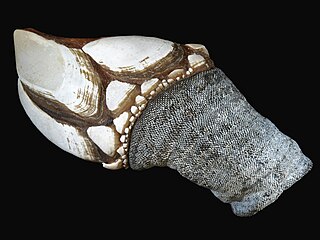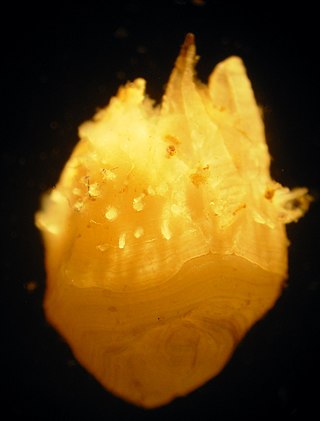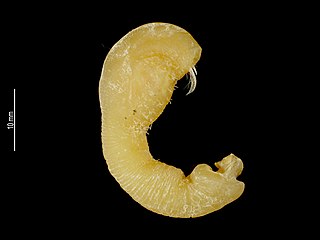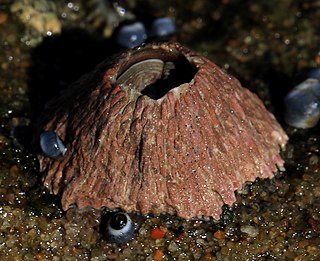
Barnacles are arthropods of the subclass Cirripedia in the subphylum Crustacea. They are related to crabs and lobsters, with similar nauplius larvae. Barnacles are exclusively marine invertebrates; many species live in shallow and tidal waters. Some 2,100 species have been described.

Cryptomeria is a monotypic genus of conifer in the cypress family Cupressaceae. It includes only one species, Cryptomeria japonica. It used to be considered by some to be endemic to Japan, where it is known as Sugi. The tree is called Japanese cedar or Japanese redwood in English. It has been extensively introduced and cultivated for wood production on the Azores.

Goose barnacles, also called percebes or turtle-claw barnacles or stalked barnacles or gooseneck barnacles, are filter-feeding crustaceans that live attached to hard surfaces of rocks and flotsam in the ocean intertidal zone. Goose barnacles formerly made up the taxonomic order Pedunculata, but the group has been found to be polyphyletic, with its members scattered across multiple orders of the infraclass Thoracica.

Sessilia is an unranked clade of barnacles, comprising the barnacles without stalks, or acorn barnacles. They form a monophyletic group and are probably derived from stalked or goose barnacles. Sessilia is divided into two orders. The Verrucomorpha contain two families, Verrucidae and Neoverrucidae, and the remaining 14 families are in the order Balanomorpha.

The Balanomorpha are an order of barnacles, containing familiar acorn barnacles of the seashore. The order contains these families:

Spiraea japonica, the Japanese meadowsweet or Japanese spiraea, is a plant in the family Rosaceae.

Seashore wildlife habitats exist from the Tropics to the Arctic and Antarctic. Seashores and beaches provide varied habitats in different parts of the world, and even within the same beach. Phytoplankton is at the bottom of some food chains, while zooplankton and other organisms eat phytoplankton. Kelp is also autotrophic and at the bottom of many food chains. Coastal areas are stressed through rapid changes, for example due to tides.

Acasta is a genus of barnacles in the family Balanidae, containing the following species:

Lottia subrugosa is a species of sea snail, a true limpet, a marine gastropod mollusk in the family Lottiidae. It is still designated under its synonyms Acmaea subrugosa or Collisella subrugosa in many textbooks.

Catophragmus is the originally named genus of the family Catophragmidae. At present, it is monotypical. It is a shallow water acorn barnacle of the Tropical Western Atlantic and Caribbean characterized by small accessory imbricating plates surrounding the base of the shell wall.

Heteralepas is a genus of goose barnacles in the family Heteralepadidae. which was first described in 1907 by Henry Augustus Pilsbry.

Tetraclita is a genus of sessile barnacles in the family Tetraclitidae. There are more than 20 described species in Tetraclita.

Tetraclitidae is a family of sessile barnacles in the order Balanomorpha. There are about 10 genera and more than 50 described species in Tetraclitidae.

Tetraclita rubescens, commonly known as the pink volcano barnacle, is a species of sessile barnacle in the family Tetraclitidae.

Tetraclita serrata, the grey volcano barnacle, is a species of symmetrical sessile barnacle in the family Tetraclitidae. It is found in Africa.

Tetraclita squamosa, the green volcano barnacle, is a species of symmetrical sessile barnacle in the family Tetraclitidae.

Tetraclita stalactifera, the ribbed barnacle, is a species of symmetrical sessile barnacle in the family Tetraclitidae. It is found in the western Atlantic Ocean.

Tetraclita rufotincta is a species of symmetrical sessile barnacle in the family Tetraclitidae.
















